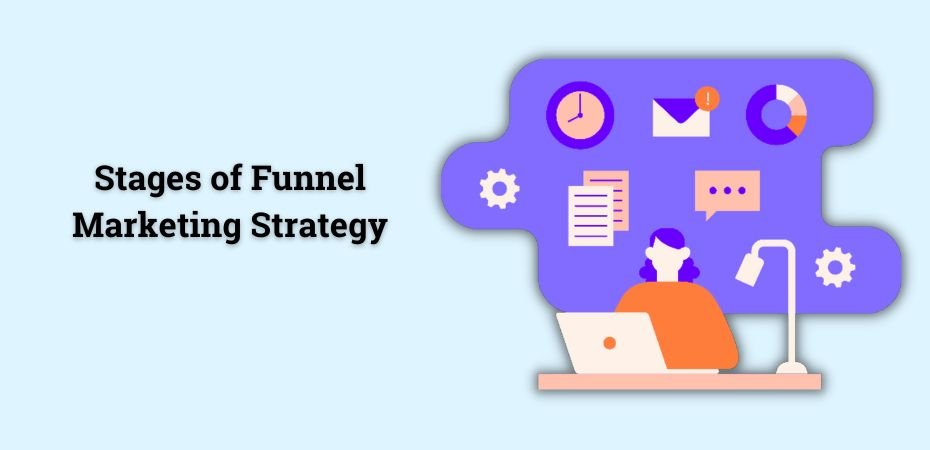A funnel marketing strategy is a plan for guiding potential customers through the different stages of the buying process. From awareness to consideration to action. This typically involves creating content and using marketing channels to reach potential customers at each stage of the funnel. Then, measuring and optimizing the performance of the funnel to ensure that it is effective. The goal of funnel marketing strategy is to turn potential customers into actual customers. You do this by giving them the information and incentives they need to purchase.
Table of Contents
In this guide, we will discuss the importance of a funnel marketing strategy. We also provide some tips for creating and implementing a successful strategy. Let’s start by defining a marketing funnel.
What Is a Marketing Funnel?
A marketing funnel is a way of describing the journey a customer goes through when they interact with a business. It starts with the initial contact a customer has with a business, often through a marketing campaign or advertisement. It then ends with the customer making a purchase or taking other desired actions.
The “Funnel” is wide at the top, where there are many potential customers. And, it’s narrow at the bottom, where only a few customers take the desired action. The top is where marketers should generate leads because 79% of missed conversions stem from top-of-funnel inefficacy.
The idea behind the marketing funnel is to move as many potential customers as possible through the different stages of the funnel. Ultimately it leads to them making a purchase or taking other desired actions.
Related: Content Marketing Tools to Boost Awareness and Make Money in 2023
Examples or Stages of Funnel Marketing Strategy
The brief description of the stages of funnel marketing strategy are as follows:
1. Awareness
The first stage of the marketing funnel is awareness. In this stage, the goal is to get potential customers to become aware of a product or service. This happens through various marketing techniques, such as advertising, social media marketing, content marketing, or search engine optimization.
2. Consideration
Once potential customers are aware of a product or service, the next stage is a consideration. In this stage, the goal is to get people to start thinking about making a purchase. This happens through things like product demos, free trials, or special offers.
3. Action
The final stage of the marketing funnel is action. In this stage, the goal is to get people to make a purchase. This happens through things like special deals, limited-time offers, or other incentives that encourage people to take action.
At each stage of the marketing funnel, the goal is to move potential customers closer to making a purchase. This is because 79% of leads go only some way to sales conversions.

Using various marketing techniques, businesses can effectively guide potential customers through the funnel and turn them into actual customers.
Once you have created and implemented your strategy, it is important to continue to monitor and adjust your strategy as needed. This will help ensure that your marketing efforts are effective and that your funnel is converting potential customers into actual ones.
Also read: The Importance of Online Marketing for Business Growth in 2023
Top 10 Tips for Your Top-of-Funnel Marketing Strategy
Watch out the below video in order to know 15 essential components of Funnel Marketing.
The following tips will help you use marketing funnel strategy effectively:
1. Identify your target audience
The first step in creating a successful top-of-funnel marketing strategy is to identify who your target audience is. This will help you tailor your marketing efforts to the specific people who are most likely to be interested in your product or service.
2. Create Engaging Content
To capture the attention of potential customers, it is important to create engaging content that is interesting, informative, and relevant to your target audience. This might include blog posts, videos, infographics, or other types of content designed to educate and entertain potential customers.
3. Use Social Media to Reach Your Target Audience
Social media is a powerful tool for reaching potential customers at the top of the funnel. Regularly posting engaging content on social media platforms can build awareness of your brand and attract potential customers to your website or landing page.
4. Run Paid Advertising Campaigns
Paid advertising can be an effective way to reach potential customers at the top of the funnel. With platforms like Google Ads or Facebook Ads, you can target your ads to specific demographics or interests. This can drive traffic to your website or landing page.
5. Use SEO to Improve Your Visibility
Search engine optimization (SEO) is a key component of a successful top-of-funnel marketing strategy. Optimizing your website and content for relevant keywords can improve your visibility in search engine results. This will attract potential customers to your website or landing page.
6. Offer Free Trials or Demos
At the top of the funnel, it can be effective to offer potential customers the opportunity to try your product or service for free. This can help them get a feel for what you have to offer. It can also encourage them to move further down the funnel toward making a purchase.
7. Host Webinars or Workshops
Webinars and workshops can be a great way to engage with potential customers at the top of the funnel. By offering educational or informative content, you build trust and credibility with potential customers. Also, you encourage them to learn more about your product or service.
8. Use Customer Testimonials
Customer testimonials can be a powerful tool for attracting potential customers at the top of the funnel. Sharing positive experiences with real customers can build trust and credibility with potential customers. It can also encourage them to learn more about your product or service.
9. Offer Exclusive Deals or Discounts
At the top of the funnel, it can be effective to offer potential customers exclusive deals or discounts on your product or service. This can create a sense of urgency, and encourage potential customers to take action and move further down the funnel. Sales are boosted by 6-9% when there’s a sense of urgency.
10. Test and Optimize Your Strategy
Finally, it is important to regularly test and optimize your top-of-funnel marketing strategy. By tracking the performance of your marketing efforts, you can identify what is working and what isn’t, and. You can also make adjustments as needed to improve your performance.
Related: How to Make Money Using Web Marketing Strategies in 2023?
Why are Marketing Funnels Important?
A digital marketing funnel is important for several reasons.
First, it provides a framework for understanding the different stages of the buying process, and how potential customers move through each stage. Providing the right information and incentives at every step of the funnel can help businesses tailor their marketing efforts to their audience.
Second, a digital marketing funnel can help businesses track and measure the performance of their marketing efforts. By analyzing data and metrics, businesses can understand how effective their funnel is at turning potential customers into actual ones. Then, they can make adjustments as needed to improve performance.
Third, a digital marketing funnel can help businesses optimize their marketing efforts. By analyzing data and metrics, businesses can identify areas where they can improve their marketing strategy. Also, they can make changes to their funnel to better engage with potential customers and encourage them to make a purchase.
Overall, a digital marketing funnel is an important tool for businesses. It helps them understand, track, and optimize their marketing efforts to turn potential customers into actual ones.
Related: Top 5 Email Marketing Software to Improve Your Marketing Campaign for 2023
Conclusion
In conclusion, a funnel marketing strategy is an important tool for businesses. It provides a framework for understanding the different stages of the buying process. Also, it helps businesses tailor their marketing efforts to the specific needs of their target audience.
By tracking and measuring the performance of their funnel, businesses can understand how effective their marketing efforts are. They can also make adjustments as needed to improve performance.
By optimizing their funnel, businesses can improve their ability to engage with potential customers and encourage them to make a purchase. Overall, a funnel marketing strategy is an essential tool for any successful digital marketing plan.
[article_faq]





